Background
I started getting ready for my trip to Latin America in January 2006. It would involve the organization of a one-day meeting of regional institutions my unit works closely with, plus participation in a conference devoted to safety and health matters in Argentina. On my way back, I would also visit Fundacentro, Brazil's national occupational safety and health (OSH) institution, in São Paulo. As a private side-trip I would also go to Rio de Janeiro - for me it is inconceivable to go that far and not see this famous city.
My contacts in both Argentina and Brazil were very helpful. They recommended hotels in Buenos Aires and São Paulo - for me, the key point was nearness to my hosts. I had never been to these cities, but I did know that they are enormous - I did not want to have to spend a lot of time commuting between the hotel and my mission locations. It was up to me, however, to make my reservations with the hotels - fortunately, this is very easy in the Age of Internet.
Flight to South America
This may be one of the longest flights I have ever been on. My wife drove me to the airport around 5 pm, I took off, leaving her to deal with the household for 2 weeks or so. I was flying with Lufthansa, the flight from Geneva to Frankfurt was just over an hour. Frankfurt is not one of my favourite airports - lots of staircases with no escalators next to them - even with limited (but heavy) hand-luggage, this can make rushing around irksome. But I didn't want to wander around too much, I had a long night flight to look forward to. I did buy extra memory for my camera though - my previous trip to Barcelona had taught me that having a capacity of only a 100 or so pictures is not very much. So I bought a bigger memory at the duty-free electronic goods store, with enough capacity for 1000 pictures. Then off to the Business Class lounge - at least I had that. Free peanuts and drinks, to keep me amused until the flight for which I had to present myself around 8:30 pm.
There was a large crowd at the gate - not surprising, Lufthansa flies Boeing 747s to South America. Lots of Spanish and Portuguese-speaking passengers - this is exciting, I am off to someplace I haven't been to! Finally the gate is opened, and off we go to board the plane.
As I said, I am in Business Class - I am on business, after all. I am not even sure I would wish to take such a long flight in tourist class, long flights with little leg-room are becoming really uncomfortable at my age. Unfortunately I could not get a window seat, indeed I am in one of the two middle seats - the configuration is 2-2-2. My neighbour is a young Bolivian businessman of German ancestry - he claims he speaks Spanish, German and English with equal fluency. He is back from Hong Kong on a business trip - he must be exhausted already, and he isn't even half-way home. I ask what he trades in - he says "Anything that's legal". He talks about his life back in Cochabamba - sounds like a good life, all the technological marvels the modern world has to offer, plus servants of course. He is carrying a stuffed bear for his young son. The food offered by business partners in China and Hong Kong is incredibly good, he says. But we don't talk long - he must do this a lot, he seems to fall asleep at will.
I can't, on the other hand. I eat my dinner, then watch a movie - instead of one large screen, we all have tiny screens that can be pulled out of the armrest. It's all rather uncomfortable - if you have your meal tray (stand? drawer?) out, it's hard to manipulate the TV screen, you can't pick up newspapers or magazine from the floor, it's like being in a badly designed hospital bed. And this is Business Class! The movie I watch, by the way, is from South Africa, doing what movies from there do best: a young (white) boy taking a cheetah back into the wilderness. The wisdom of age is transmitted to him by a black man who is also on a quest, although it's unclear what kind of quest.
A few hours of true blackout, I manage to sleep a little bit. But then it's dawn, and a stop in São Paulo. My businessman neighbour leaves here - he has another flight to catch to Bolivia. Brazilian cleaners come into the cabin, speaking a language I have only heard in movies (and Brazilian soap operas) until now: Brazilian Portuguese. It has a lovely lilt to it. Fortunately, many people leave the plane, and I can transfer to a window seat. The plane takes off again, it's a beautiful clear day outside, the plane flies a few kilometres inland from the ocean shore, it's a true geography less on out there. Quite mountainous terrain, I can see mountaintop ranches, winding country roads, lots of rivers, forests. Then it's lake country. Finally, all becomes very flat - we must be above Uruguay by now, or close to it. Then we turn westward, and suddenly I glimpse what must be one of the great waterways of the world: the Rio de la Plata. It's incredibly wide, even from 10km up. I can see a broad river flowing into it from the northwest, in a complex delta arrangement - I try to remember my geoography, is that the Paraná river? I check later, it is, in fact.
The plane swings right over Buenos Aires next. It's just before 9 am here, 2 pm back in Europe. I have hardly slept for 30 hours or so, but I can handle it, this is an exciting new city, the first big city south of the Equator in my whole life! I know that it's very large (10 million or more with suburbs), and indeed, it looks large:
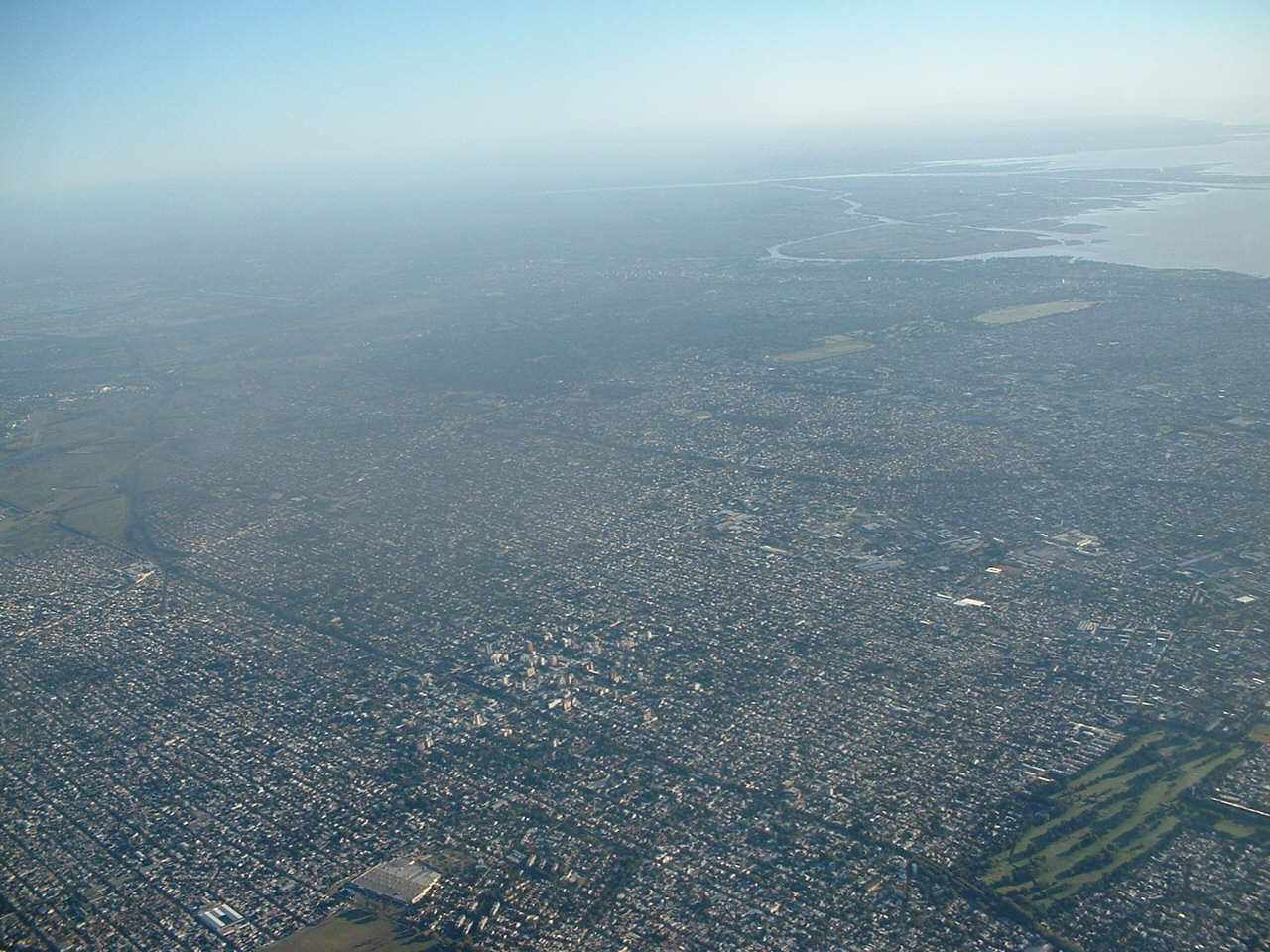
You can see the Rio de la Plata in the distance.
The plane prepares for landing, makes a broad swing over to the west then turns backs to the east. It's a clear day, and I can see far, far away, and it's all incredibly flat. It reminds me of Edmonton, Alberta - but there there are lakes to break the monotony, here there is nothing.
Arrival in Buenos Aires
We land, I can get out from the plane quickly thanks to my Business Class status, and I try to profit from this, making a beeline for immigration. Canadians don't need a visa to enter Argentina, I pass through very quickly. My luggage is delivered quickly too, I am out through customs quickly as well. And someone is waiting for me, as promised: a driver sent by my hosting organization. He speaks nothing but Spanish, I must rely on my knowledge of that language from now on. And it's just like what my linguistic texts tell me: lluvia (rain), which there hasn't been much of lately, is pronounced "shoo-bya" (for people who can read the International Phonetic Alphabet: ['ʃu:βja]), and the driver calls me "vos", not "Usted". But before I get into the car, I must change some money - it's Sunday, who knows how easy it is to do this downtown? The currency is the Peso, worth 3 to the US dollar, down from the 1:1 parity the Peso had been introduced at after years of hyperinflation.
We take an expressway into town, the driver tells me it's a 30-minute drive. We chat on the way, I understand him (mostly). We get onto an expressway , we have to stop twice to pay tolls. We pass a football field, it's where the Argentinian National Football team practices for this summer's World Cup, my driver informs me. Also, that Argentina would love to win, but the Brazilians probably will win (this seems to be the consensus opinion down there). Traffic is not heavy - it is Sunday morning. Most cars seem to be in good shape, this is not a dirt-poor country, clearly. They are all European-size cars, not North American-size. I catch some brand names: Peugeot, Renault, Volkswagen, the odd Mercedes. Some not-too-modern buses, an open truck with people looking as if they were Indians from the Andes, carrying vegetables. A big truck carrying frozen fish from Patagonia. How exotic! I try to make sense of the billboards - I enjoy the Argentiniasms I notice, like mandá (send!) and vos sos (you are).
We enter downtown, crossing some extremely wide avenues - one of them, the Avenida 9 de Julio, supposedly the widest in the world. On it is the "Obelisco" - a local landmark, although I could not discover what it is supposed to commemorate:
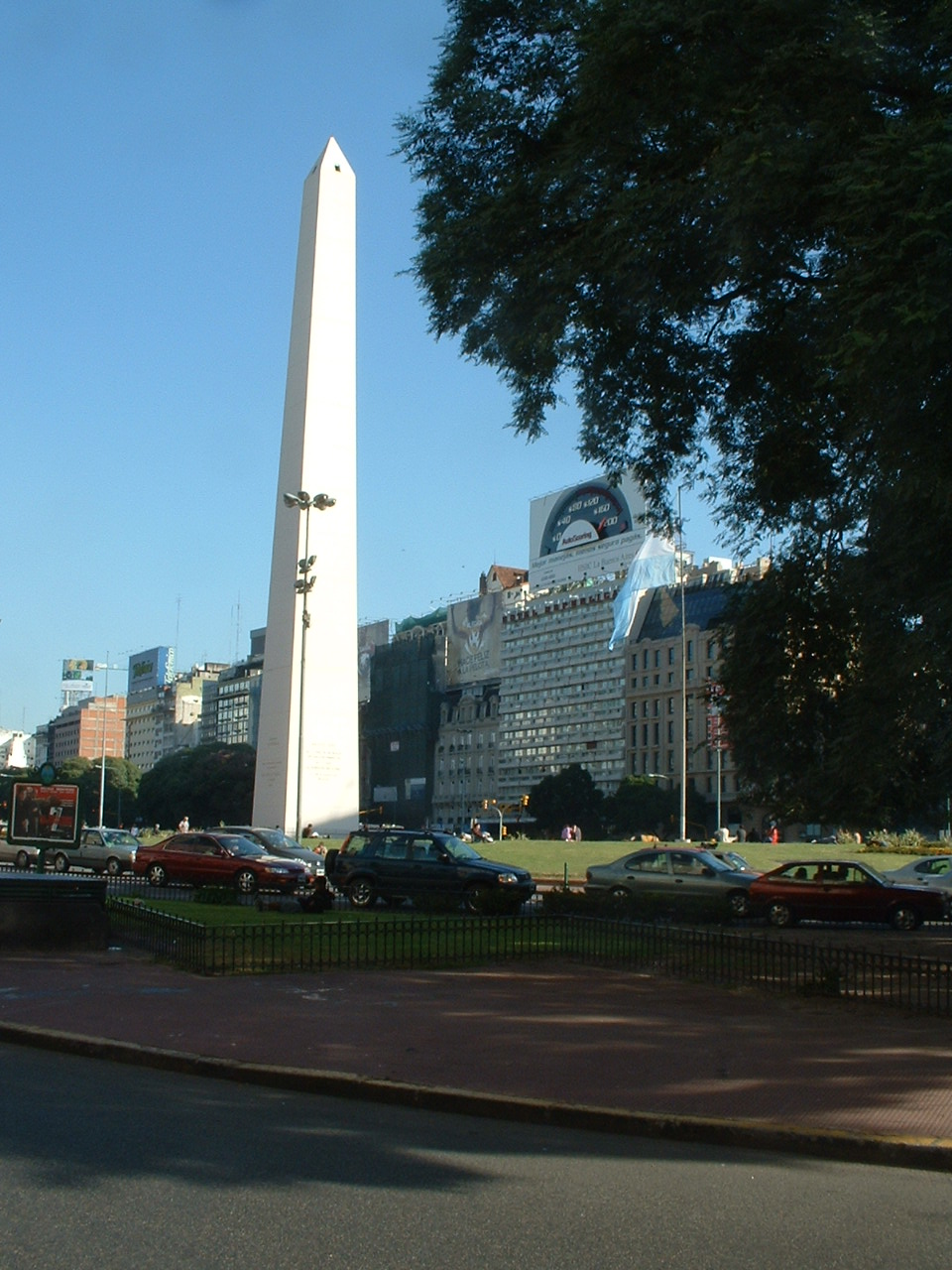
Soon we are at my hotel: the Hotel Gran Buenos Aires. My driver drops me and leaves - here I am entirely on my own. Fortunately, there are no problems, my reservation is on record. I am shown to my room. Nothing fancy, three-star accommodation, but it will certainly do. The TV has lots of channels, including BBC World that always makes me feel I am staying in touch with world events, and lots of local channels, including two that seem to be entirely devoted to cooking.
After a shower and some rest, I decide to venture out - it's only noon, after all. I don't have very good maps, but what I have is good enough to orient myself downtown. I discover that I am just a block away from the Calle de Florida, the famous shopping street of the city. It turns out to be a pedestrian mall, a bit like the Sparks Street Mall in Ottawa - nothing spectacular, but exotic enough to be interesting:
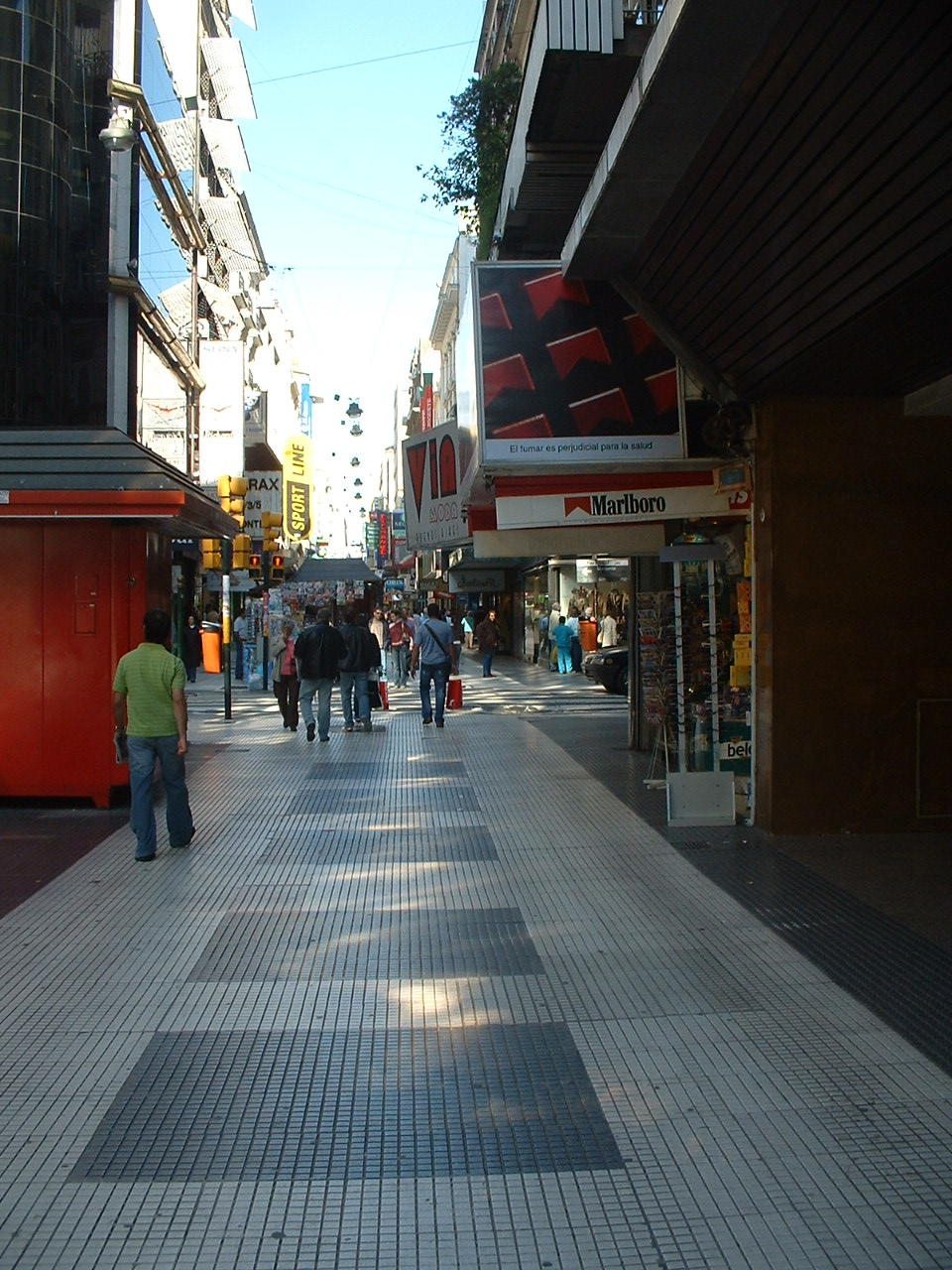
The local specialty becomes quickly obvious: every second store carries cuero, leather. Shoes, bags, leather jackets, anything in leather in great variety. Also, many bookstores, both new books and second-hand. This is always a good sign, I am in a civilized place.
There are some beggars and street people, but not too many. Most people seem to be well-dressed, enjoying a leasurely Sunday afternoon out with their family or friends. The shops are open - whether because this is a special street or not, I don't of course know. After a few blocks, I arrive at the "Galerías Pacífico", a modern shopping centre inside a historical monument - an end-of-century (19th century, that is to say) building reminding me of similar buildings in Paris and Budapest. It has been entirely renovated, and is chock full of leather stores, more leather stores, all the famous clothing and jewelry chains of the west, plus bookstores, toy stores and so on. I go into one of the bookstores (where else?), and the manager is so impressed by my interest in Argentinian writers (Borges, Cortazar) and Argentinian history that he assigns a long-haired student to advise me on what books to buy. It is hard to escape without spending my year's quota of book purchases. But I better start shopping right away - I am here on business, who knows how much time I will have later on during the week?
Then I feel hungry, I decide to try what looks like the local equivalent of a food court, at the bottom level of the Galerías. Of course steak is an option - with a side order of fries and salad, I manage to get my message across to the food court staff. As I will find out during the week, steak here is always plentiful and good - even in a food court. Prices are not that low, by the way - 15 pesos or so, $5 US. Not that much for me, but many people here earn $3-400 a month.
I spend 2 hours or so exploring the Galería, then I venture outside again, and start exploring the city a bit more. A girl comes up to me, asking whether I was a Leo? In fact I am, and she is so impressed by her ability to guess such things that she convinces me to give her some money for a charity of some kind. I didn't have the heart to tell her that she didn't guess my wife's astrological sign right!
It's a beautiful, sunny day, not a cloud in the sign, The temperature must be about 25°C. Yet this is the end of April, the equivalent of October in the northern hemisphere.
I explore some of the side streets of Calle Florida - I don't like to get too adventurous on my first day in a strange city. The side streets are not as stylish as Calle Florida, but no worse than streets near Yonge Street in Toronto or Granville in Vancouver. There are lots of people everywhere - as I find out later on after it gets dark, there are always people around, even at midnight. Also, streets are very well lit at night - if this is a dangerous city (all South American cities are supposedly dangerous), I see no special signs of it. Possibly it is a case of false security, and of course I stick to the downtown areas - but at no time am I threatened, or do I even feel threatened.
Slowly, jet lag is getting to me. I go back to the hotel with my heavy book purchases (although they could have delivered them to my hotel, free of charge - not a service you normally get at the Eaton Centre), I rest awhile, then I decide that I do need a proper dinner. I venture out again, it's about 7pm and pitch dark. I don't have far to go - there is a friendly-looking corner restaurant not far from the hotel, nothing fancy. Fast, friendly service - they always seem to bring salty tidbits with various sauces to patrons in Argentinian restaurants, even before they look at the menu. Of course, I have a real steak this time, with a glass of local red wine - that too is quite good. As I said, service is fast and good - yet the waiter, the owner and everyone else are watching football on TV, a local match involving two first-division teams. A very excited commentator: every time someone scores, he shouts gooooooooooooal at the top of his voice.
But I hardly notice - I am really tired by now, it's time to sleep off my backlog.
Buenos Aires - Monday
Monday morning. Breakfast, more or less American style - buffet with eggs, bacon, toast, orange juice. Very good coffee - I will not mention it again, coffee is always good in this part of the world.
I still don't quite know my way around, I decide to take a taxi to my hosts, Argentina's National Labour Inspectorate. I shouldn't have - traffic is so heavy and slow in the narrow side streets we have to follow that the taxi driver himself recommends after a while to walk the rest of the way.
I am received with a lot of warmth. The fact that I manage to speak Spanish pleases people. I ask the head of library services to go through my paper with me, just to make sure that the language in it is OK - and she does it. In fact, improvement is needed mostly in syntax, idiom and vocabulary, my grammar and spelling are mostly fine.
I am taken around to meet various officials. One of them invites me to join him in an Argentinian ceremony - the drinking of yerba mate. It's a bitter (and hot) caffeinated brew that is sipped communally around the table - everyone sips it from the same pot, using the same metallic "straw". Bitter beverages are not usually my thing, but this is famous, this is the real Argentina, I must absolutely try it. It is very bitter, and if it perks me up more than coffee does, I don't notice it.
For lunch I am invited by one of the top brass to a stylish steak restaurant, one of the best it seems. Two ladies from the library are also there. The restaurant itself is quite a treat - pictures and scale models of gauchos, horses, horse gear and cattle everywhere, high ceilings, a beautiful garden outside. An excellent and varied salad to start with, than comes the ordering, and of course I don't know what to order. There are half a dozen different cuts at least, plus various ways to prepare the meat. I ask for advice, explain that I usually like steak well done, finally something is ordered in my name. Do I want half a kilo or a kilogramme? I said that there is no way I can eat one kilogramme of solid beef for lunch. The food arrives, it is very good, needless to say. Halfway through, a waiter observes that my meat needs more grilling or simply heating up (I don't know which), he takes it away to reappear with the improved version a few minutes later. Good Argentinian wine accompanies the food - they sure don't need European imports here. My host - a doctor - directs the conversation, he clearly knows his food, he loves cooking in fact. This may be a macho country, but all the men I talk to know good food, and love to prepare it.
The topic of the recent movie "Brokeback Mountain" (which I haven't seen) comes up. I said, this kind of thing doesn't happen among gauchos, does it? My host laughs and says "you never know".
I am pleasantly surprised at how well I manage to keep up in an Spanish conversation (especially when it's with an Argentinian accent) - after all, I have never spent more than two weeks at a stretch in a Spanish-speaking country, and usually in English-speaking company. Here I can't even rely on the English crutch - I don't know if the others even know English.
After all that heavy food and wine, not much gets done back in the office - but, fortunately, my paper is now finished, the preparations for tomorrow's meeting are done, I can take off relatively early. Having learned my lesson in the morning, I walk the 10 blocks or so back to the hotel, funny as I feel carrying my briefcase and wearing a jacket. Then off to another exploration, this time making it to a somewhat more downmarket pedestrian mall perpendicular to Calle Florida. There are some cinemas here - the evening promises to be long and lonely, I end up going into a cinema and seeing "Rumor has it", in which Jennifer Aniston is led to believe that the movie "The Graduate" may have been based on a real story involving her mother and grandmother. Fortunately Argentina seems to be a subtitling and not dubbing country, because I detest dubbed movies. The cinema is quite shabby, there is a street person camped in the seat in front of me. The movie is pretty inane - question: why didn't they at least get Dustin Hoffman to play the male lead? He is still around and kicking.
For dinner, I sit down in an outdoor pizzeria on the same street. Buenos Aires is half Italian - lots of Italian food here. The pizza is enormous, I can't finish it. Two or three beggars come up to me while I am eating, a rather disconcerting experience. After I decide I can't eat any more, I suggest to the waiter that he give the rest to some hungry passer-by - I expected him to take the pizza inside, maybe cut it into smaller pieces - but no, he stands around, waiting for some beggar to go by, but this just doesn't happen, and he gives up.
It's close to midnight by now, I walk back to the hotel with some trepidation, because there are fewer people on the street. But nothing happens (to me), although I do see a couple of policemen searching a youngish man on a streetcorner.
Buenos Aires - Tuesday
This is my big day - I have to present a rather longish paper, than preside a day's worth of discussions. But I need not have worried, everything goes smoothly. Aside from Argentinians, there are people there from other safety and health institutions - one each from Uruguay, Chile and Brazil. Since the Brazilian lady will be my hostess in São Paulo, I talk to her quite a bit - and she surprises me by offering to pick me up at São Paulo airport when I get there. This does relieve me a bit - the idea of dealing with Brazilian taxi drivers on my arrival in Brazil is not too appealing.
I don't have much else to say about the Meeting. Suffice it to say that when it's over, I get back to the hotel, and I decide to explore BA a bit further than I have done so far. I have seen a number of references to the Feria del Libro, the annual Buenos Aires book fair. It's open until quite late, why don't I go to it - I missed the Geneva Book Fair this year, after all, precisely because of this trip to South America.
I suppose I could take a cab, but I am a public transport fanatic, I should discover how the Buenos Aires metro (the famous subte) works. And I do. It's simple and inexpensive - a one-way ticket is 0.70 pesos, or about a US quarter. It's crowded at rush hour, not too bad otherwise. This is what a subte train looks like:
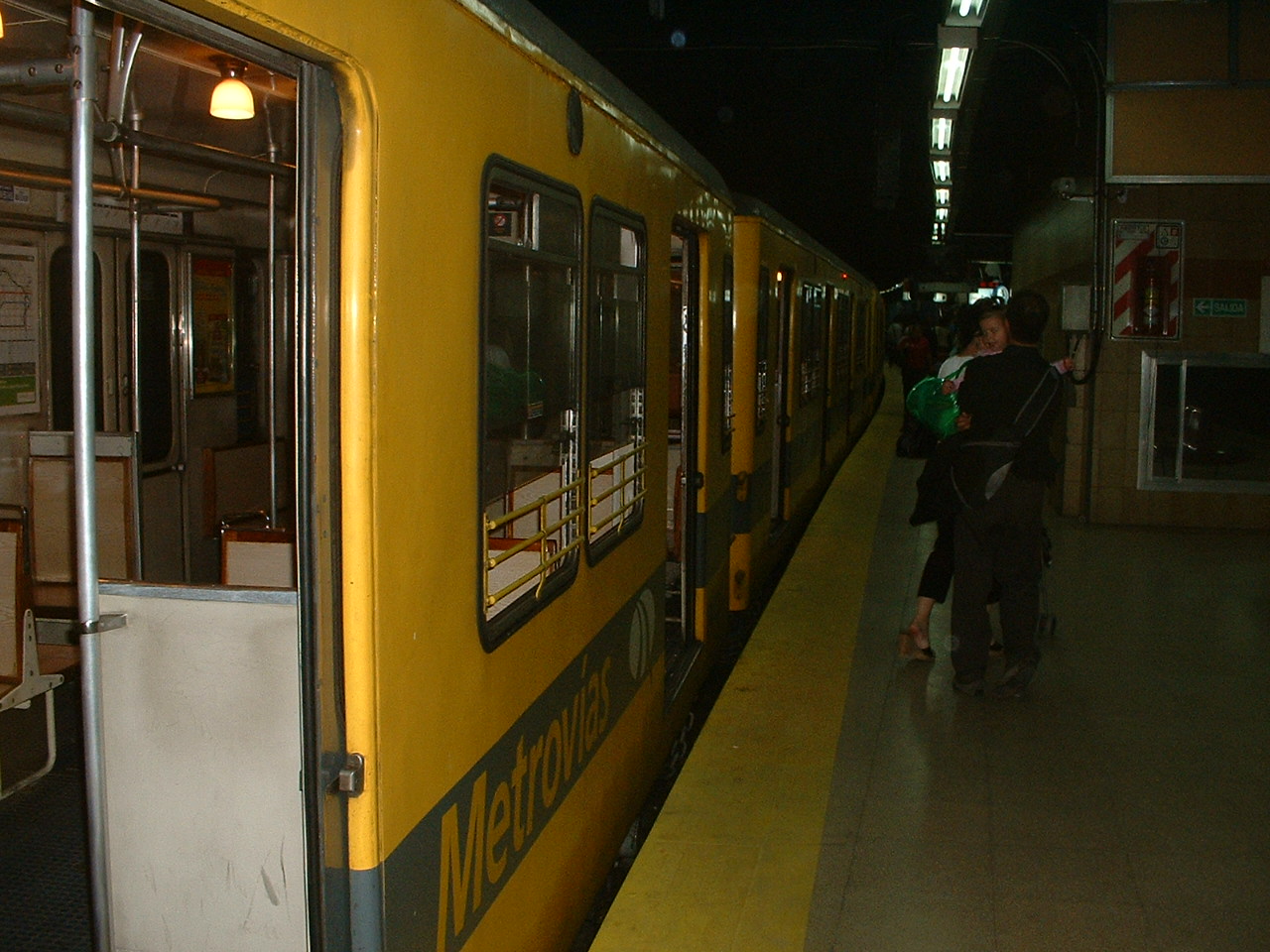
I take the subte to Plaza de Italia, near which the book fair is supposed to be. I come up to the surface - it's dusk now, I am disoriented - which way is north and which way is south? A lot of traffic, lots of people on the sidewalks, this is clearly a not-quite-central square in this enormous city. I feel a bit like the hero of the Hungarian writer Ferenc Karinthy's Epepe - in a strange city, having no idea where exactly I am. Oh well, at least I know the language (somewhat).
I decide that looking at street numbering may help, and I follow in a direction my map and my intuition tell me to follow. After 10 minutes or so, I am clearly getting nowhere - if there was a major book fair hereabouts, I should see a major entrance to the fairgrounds, people with plastic bags advertising publishers, that kind of thing.
So I turn around, and - wonder of wonders - I find my book fair. At a certain point I should have walked in this direction, rather than 90° that way. This is what happens in strange cities, and why it's better to explore such cities on one's own - at least I am not penalizing other people with my mistakes (neither do I get into fights over my wrong choices).
As I approach the ticket booth, a man simply comes up to me and hands me a free ticket - it also offers free entrance to the launch of some religious publication, but who forces me to go to that? I express my thanks, and enter the fair.
The fair is enormous. It is in three vast exhibition halls, each with a good 100 or so stands. It's mostly Spanish-speaking publishers and distributors of course, but there are others as well, including such oddities as Galician (the Spanish province of Galicia has been a major source of immigrants to Argentina), Greek and Japanese. No Hungarian though.
I don't usually spend much time at book fairs in the display areas of major publishers and booksellers - the books there I can find in any bookstore. I look for the offbeat - here, for example, I found the stand of a publisher specializing in Patagonian materials. For example, I picked up a book called "El Rey de Patagonia - Orellie Antoine I, Rey de Araucanía y Patagonia", by Claudio Morales Gorleri. This is the true story of a 19th century Frenchman, who set himself up as the King of a Patagonian Indian tribe, and actually wanted to do right by them - keep them independent and their culture alive. The Chilean government of course could not tolerate such a thing, defeated his army and sent him packing to Europe (while annexing the territory of the tribe).
Also, in the same stand I found an etymological dictionary of Patagonian placenames, written by Juan Domingo Perón himself. In the 1930s Perón, well before he got into dictatorship as a career, was posted as a military officer in Patagonia, and he turned some of his time to good use (from a linguistic point of view).
At the rather smallish stand maintained by the Republic of Paraguay, I locate a grammar and a dictionary of the Guaraní language, which is still widely spoken in Paraguay and adjoining parts of Argentina and Brazil. Indeed, it is the only Amerindian language (as far as I know) that has official status at the national level of at least one country (Paraguay, co-equal with Spanish). The usefulness of the grammar is diminished by the fact that much of it is in Guaraní only - Spanish is used in it here and there, but not consistently. Oh well, should I wish to actually learn Guaraní, I will just have to move to Asunción, won't I?
Lots of other interesting stands, of course. Many Argentinian provinces have their own - this is clearly a country with a strong publishing industry and lots of readers, not all of them in Buenos Aires. Large stands of university presses as well - judging by some of the titles, Marxism and anti-Americanism have maintained a strong presence here.
All good things must come to an end, it is now 9pm or so, time to think of dinner and going back to the hotel. I quit the fair grounds, walk back to Plaza de Italia and finds a very nice-looking restaurant in the old-fashioned European style - on these premises since 1920 (or so), says the sign. The restaurant is quite empty - is it too early (people in Argentina eat late, as in Spain), or are the economic times tough? It claims to be an Italian restaurant, so I have my favourite dish: Cotoletta Milanese, which is even called that here, rather than Wiener Schnitzel. With local red wine, of course.
The evening goes on, I pay, I locate my metro stop - the station is lit up but no train comes, at least not back into the city (a number pass in the other direction). A roughish looking young man comes down the stairs, waits a bit, then approaches me - should I worry? But no, he simply wants to know if a train has come in the last 10 minutes or so? I am not sure what to do - then a providential old lady shows up, looks around, then comes up to me and informs me in perfect French that no trains will be going into the city this late, I better take a cab. How did she know I was a foreigner, and why did the young man assume I was local? (French, by the way, was the language of culture in Argentina up to World War II or so, Borges talks about this somewhere).
So I take a cab, it goes through the Palermo district, this is my chance to see some of the poshest shopping parts of Buenos Aires. The avenues here would not look out of place next to the Champs d'Elysée. Stylish stores, airline offices, good department stores. And it's all brightly lit up - after 10 at night.
Buenos Aires - Wednesday
This was less of a charged day (professionally speaking). I started the day by paying a courtesy visit to my organization's office in Buenos Aires - yes, such things are part of a bureaucrat's life. This not very interesting task did allow me, however, to see the library of this office, which is probably the best library dealing with its subject matter in Argentina. Non-librarians can scoff - but I am still (in spirit) one. Then I proceeded to the Congress centre, where I listened in to a number of presentations.
In between I passed a loud demonstration (lots of drums) by trade unionists. From newspapers and TV news I got the impression that, despite a superficial calm, there are plenty of tensions in the country, and this demonstration was just one symptom:
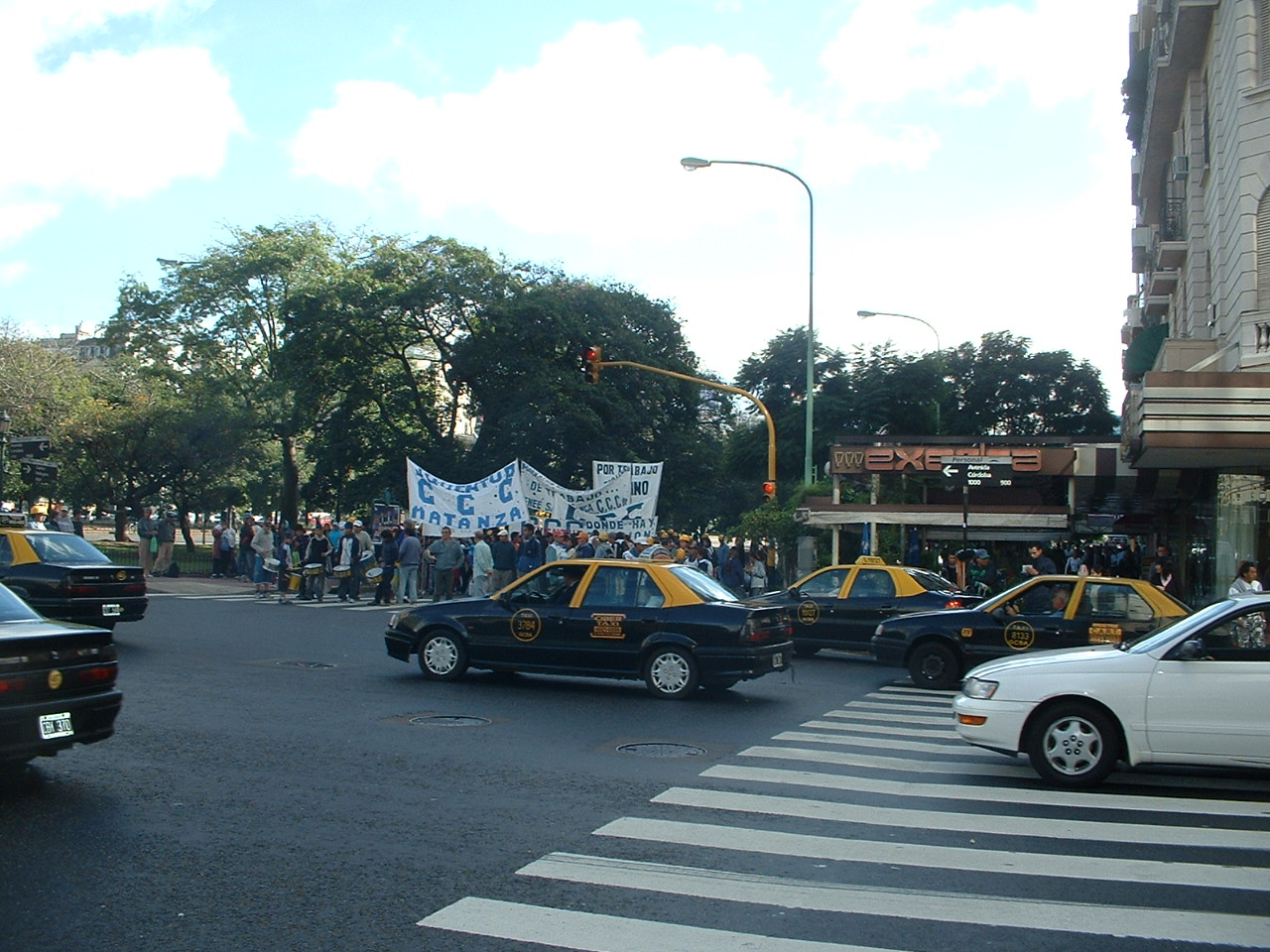
Matanza = "Killing", so whatever they complained about is not trivial.
Much of the day is spent at attending the Congress, there really is not anything interesting to report. In the evening I go back to the Calle de Florida, this is my time to do much of the shopping. Leather, of course - a leather bag for my wife, shoes for myself, belts for whomever needs them. I look at some nice leather jackets as well - some are so nice, even my interest is aroused (I am usually thoroughly bored by vestimentary matters). But, unfortunately, they are outside my budget. Too bad, I'll just have to come back to B.A., won't I?
Dinner is in the food court, then another movie: "Basic Instinct II". The subtitles do my colloquial Spanish no end of good. Could I resist a woman like Sharon Stone playing cat-and-mouse games like that with me? Probably not, but I am not going to find out - the Sharon Stones of this world are unlikely to consider me worth it.
Buenos Aires - Thursday
It's more Congress time in the morning, especially as a colleague is making a presentation, I can't miss that. But the afternoon is relatively free, I decide to explore the city a bit more.
First, I walk along Calle Florida all the way to the end, which seems to lead to the business centre of the city. It's lunch time, indeed I have lunch in what is clearly: a businessmen's restaurant, fast service, decent food, no-one cares that I am eating alone.
The main square of the city is not far - it's called Plaza de Mayo (May Square). For a city of grandiose avenues, it is relatively small, almost cosy. Its most famous feature is the main seat of the Argentinian government on one side, the famous "Casa Rosada", or "Pink House", immortalized in the musical Evita. Here are two pictures:
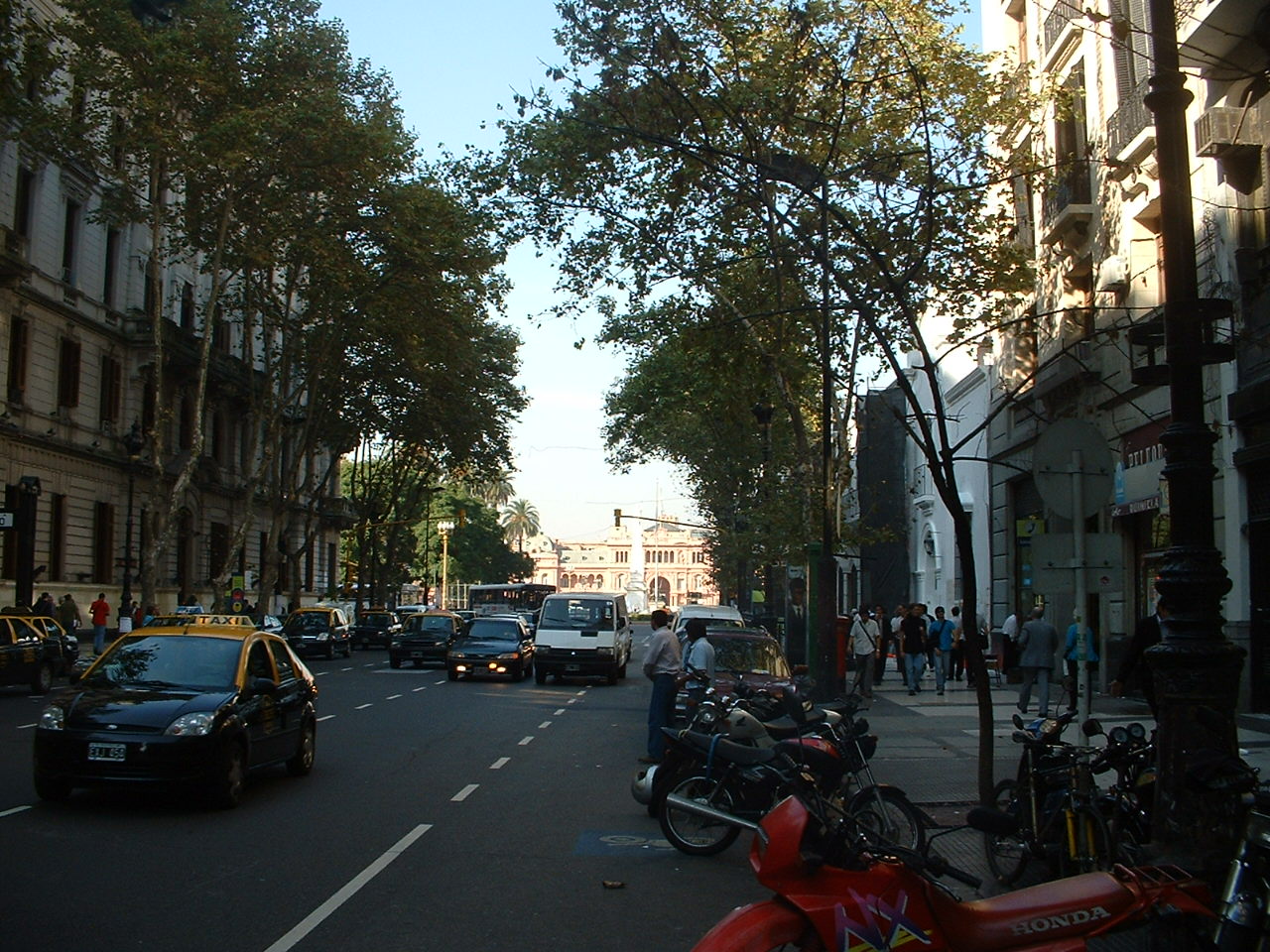
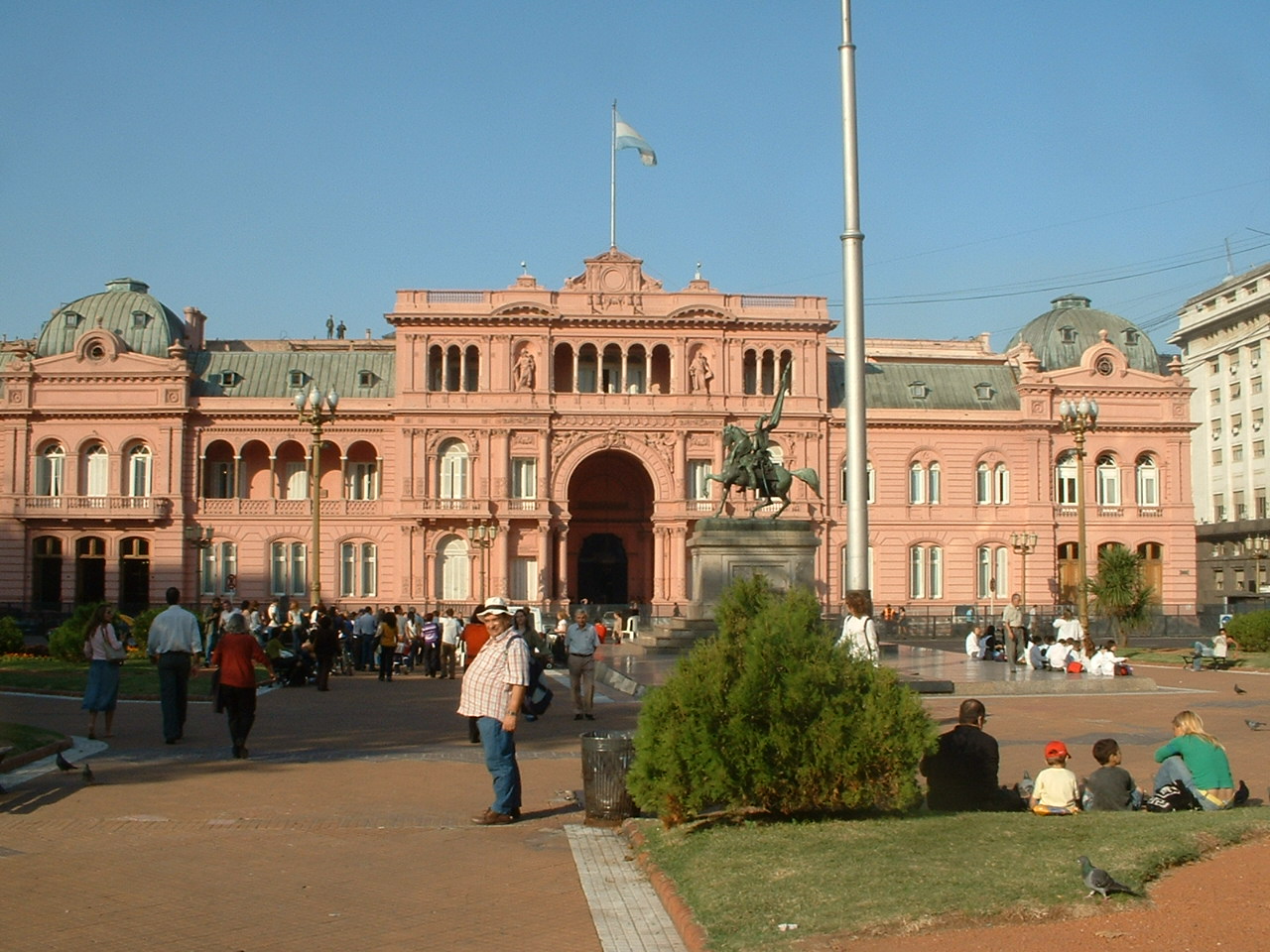
Aside from the phenomenally fat tourist in the second picture, we can see two sharpshooters on the top of the Casa Rosada - they appeared just as I started to survey the scene.
I then stumble on the famous mothers' march that takes place on this square every Thursday. It is a heart-rending sight - these are mothers (and, by the looks of it, grandmothers) of people who disappeared during the days of the military dictatorship in the 1970s. (Here is a photo:
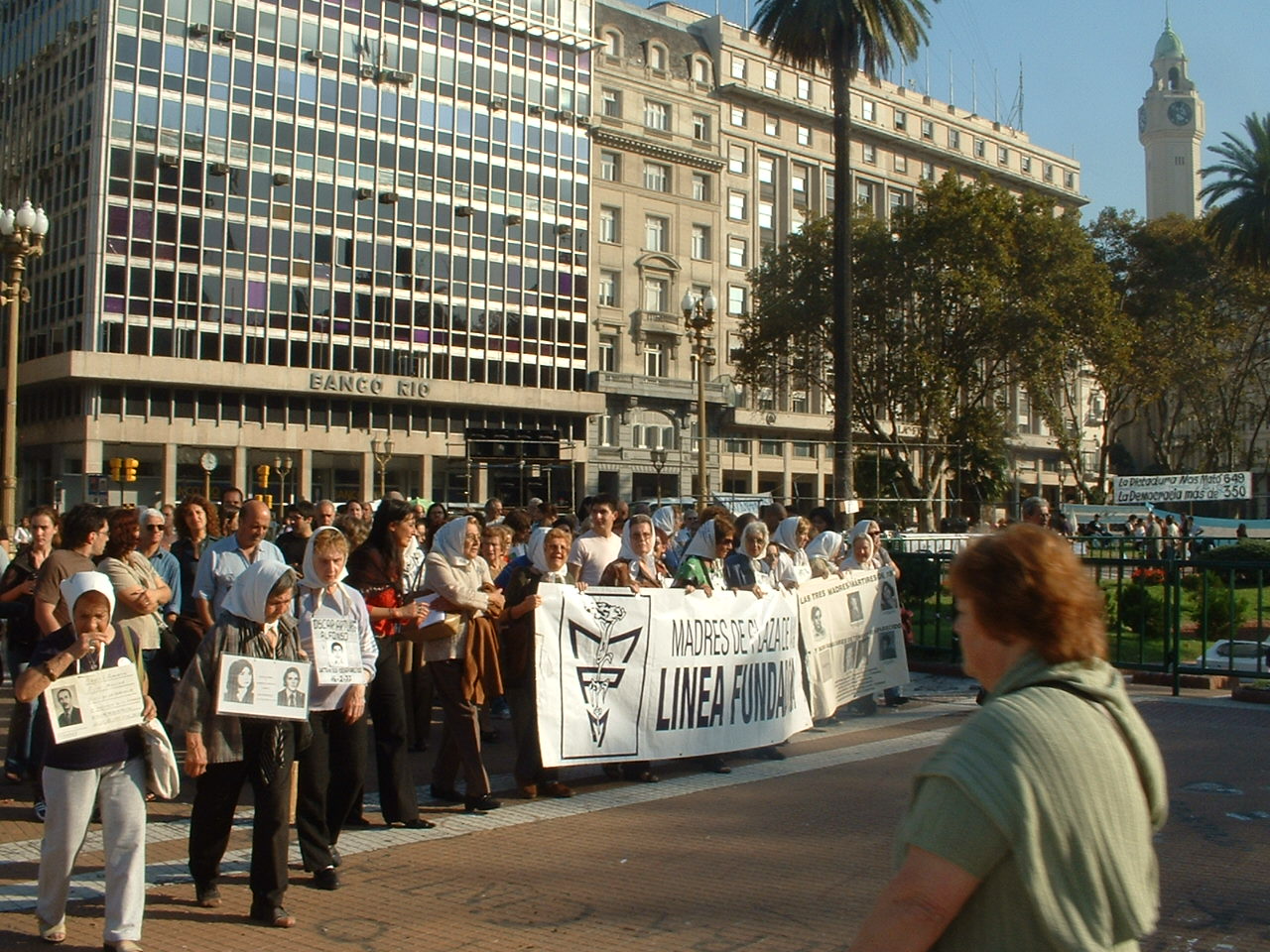
Next step: my one and only visit to a museum in Buenos Aires - I simply had no opportunity to visit another. It was "Museo de la Ciudad de Buenos Aires", not one of the best organized collection of antiquities I have seen in my life. In fact, it was hard to find - the street address did not correspond to the real address. The museum was at the top of a badly-lit staircase in a building that has seen better days. An elderly babushka (there is no better word) asked for a peso or two for the ticket. The museum consisted of a few interconnected, rather shabby, rooms. Half of it was devoted to old black-and-white photos, mostly of turn-of-the century (19th to 20th, that is) middle-class gentlemen (with spectacular mustaches), ladies and children, the latter usually dressed up in adult clothes, looking ever so proper. Then there were a couple of rooms devoted to toys popular in the 1940s and 50s.
The museum finished, it was time to embark on a longer expedition: looking for Argentina's (and possibly Latin America's) only non-tourist tramway. Locally, this line is called "Premetro", and it leaves from the outer terminus of Subte (Metro) line E, called "Plaza de los Virreyes".
TO BE CONTINUED